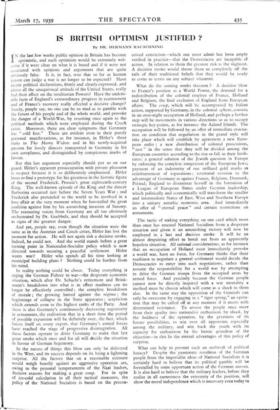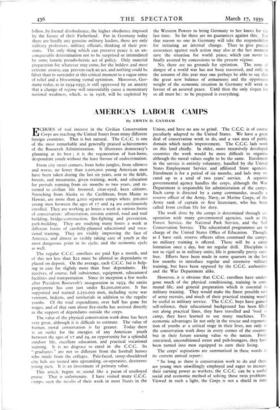IS BRITISH OPTIMISM JUSTIFIED ?
By DR. HERMANN RAUSCHNING
IN the last few weeks public opinion in Britain has become optimistic, and such optimism would be extremely wel- come if it were clear on what it is based and if it were not associated with opinions and arguments that are quite obviously false. Is it, in fact, true that so far as human reason can judge a war is no longer to be expected? Have recent political declarations, firmly and clearly expressed, and above all the unequivocal attitude of the United States, really had their effect on the totalitarian Powers? Have the undeni- able facts of England's extraordinary progress in rearmament and of France's recovery really effected a• decisive change? Surely, people say, no one can be so mad as to gamble with the future of his people and of the whole world, and provoke the danger of a World-War, by resorting once again to the political methods which were employed during the Czech crisis. Moreover, there are clear symptoms that Germany has " cold feet." These are evident even in their purely personal manifestations, as for instance, in Hitler's three visits to The Merry Widow and in his newly-acquired passion for lovely dancers .transported to Germany in his own aeroplanes, and distinguished by conspicuous marks of favour.
But this last argument especially should put us on our guard. Hitler's apparent preoccupation with private pleasures is suspect because it is so deliberately emphasised. Hitler loves to find a prototype for his greatness in the historic figure of the second Frederick, Prussia's great eighteenth-century King. The well-known episode of the King and the dancer Barberina occurred just before the Seven Years War ; and Frederick also pretended to the world to be involved in a love affair at the very moment when he forestalled the great coalition against him by his astonishing invasion of Saxony. The reassuring voices from Germany are all too obviously orchestrated by Dr. Goebbels, and they should be accepted as signs of the greatest danger.
And yet, people say, even though the situation were the same as in the Austrian and Czech crises, Hitler has lost the moment for action. He will not again risk a decisive stroke. Indeed, he could not. And the world stands before a great turning point in Nationalist-Socialist policy which is now directed towards securing a peaceful settlement. Hitler wants war? Hitler who spends all his time looking at municipal building plans ? Nothing could be further from his mind.
In reality nothing could be closer. Today everything is urging the German Fiihrer to war—the desperate economic situation, which after Dr. Schacht's retirement and Brink- mann's breakdown into what is in effect madness can no longer be effectively controlled ; the complete breakdown of morale ; the growing hatred against the regime ; the beginnings of collapse in the State apparatus ; scepticism which extends even to the highest ranks of the Party. And there is also Germany's continuously decreasing superiority in armaments, the realisation that in a short time the period of possible expansion will be definitely over, the fact, which forces itself on every expert, that Germany's armed forces have reached the stage of progressive disintegration. All these factors operate to drive Germany to make that last great stroke which once and for all will decide the situation in favour of German hegemony.
In the nature of things this blow can only be delivered in the West, and its success depends on its being a lightning surprise. All the factors that on a reasonable estimate would weigh heavily against an aggressive operation are, owing to the personal temperaments of the Nazi leaders, decisive reasons for malting a great coup. For in spite of ice-cold calculation in all their tactical measures, the Policy of the National Socialists is based on the precon- ceived conviction—which one must admit has been amply verified in practice—that the Democracies are incapable of action. In relation to them the greatest risk is the slightest. A decisive stroke would throw them so completely off the rails of their traditional beliefs that they would be ready to come to terms on any subject whatever.
What do the coming weeks threaten ? A decisive blow to France's position as a World Power, the demand for a redistribution of the colonial empires of France, Holland and Belgium, the final exclusion of England from European affairs. The coup, which will be accompanied by Italian action, supported by Germany, in the colonial sphere, consists in an over-night occupation of Holland, and perhaps a further step will be movements in various directions so as to occupy strategic key-points, as for instance the Aaland Islands. The occupation will be followed by an offer of immediate evacua- tion on condition that negotiation in the grand style will take place which will establish by agreement a new Euro- pean order ; a new distribution of colonial possessions, " just " in the sense that they will be divided among the European countries according to the rise or fall in their birth- rates; a general solution of the Jewish question in Europe by enforcing the complete emigration of the European Jews; payment of an indemnity of one milliard gold marks in reimbursement of reparations ; territorial revision to the advantage of Germany as against France, Belgium, Denmark, Poland; England to disinterest herself in the formation of a League of European States under German leadership, which politically and economically will transform the smaller and intermediate States of East, West and Northern Europe into a unitary autarkic economic area. And immediately an offer of " eternal peace " and certain restrictions on armaments.
The tactic of staking everything on one card which more than once has rescued National Socialism from a desperate situation and given it an astonishing victory will now be employed in a last and decisive stroke. It will be an almost despairing effort to break out from an apparently hopeless situation. All rational considerations, as for instance that an occupation of Holland must immediately provoke a world war, have no force, for Germany thinks that their readiness to negotiate a general settlement would decide the Democracies to enter into such negotiations, rather than assume the responsibility for a world war by attempting to drive the German troops from the occupied areas by armed force. And precisely because the German people cannot now be directly inspired with a war mentality a method must be chosen which will come as a shock to them also. In the same way the opposition of the Generals can only be overcome by engaging in a " tiger spring," an opera- tion that may be called off at any moment if it meets with determined resistance. To arouse the people once more from their apathy into nationalist enthusiasm by shock, by the boldness of the operation, by the greatness of its future possibilities, to win over all opponents especially among the military, and win back the youth with its capacity for enthusiasm by the heroic grandeur of the objective—in this lie the eternal advantages of this policy of surprise.
What can help to prevent such an outbreak of political lunacy? Despite the passionate revulsion of the German people from the imperialist ideas of National Socialism it is certainly hard to believe that its political gamble will be forestalled by some opportune action of the German masses. It is also hard to believe that the military leaders, before they realise in all earnestness the extremity of the position, will show the moral independence which is necessary even today to follow, by formal disobedience, the higher obedience imposed by the future of their Fatherland. For in Germany today there are hardly any genuine military leaders, there are only military professors, militarS, officials, thinking of their pen- sions. The only thing which can preserve peace is an un- conquerable determination not to be surprised or intimidated by some lunatic pseudo-heroic act of policy. Only material preparation for whatever may come, for the boldest and most extreme course, can prevent such an act, and nothing could be falser than to surrender at this critical moment to a vague sense of relief and a blossoming vernal optimism. Moreover, Ger- many today, as in 1934-1935, is still oppressed by an anxiety that a change of regime will unavoidably cause a momentary national weakness, which, as in 1918, will be exploited by the Western Powers to bring Germany to her knees for the last time. So far there are no guarantees against this: For that reason no one in Germany will take the responsibility for initiating an internal change. Thus to give precise assurances against such action may also at the last moment save the situation for world peace, which can never be finally assured by concessions to the present regime.
No, there are no grounds for optimism. The. zone of danger of a world war has not been traversed, and only in the autumn of this year may one perhaps be able to say that the great new balance of armaments and the oppressive weight of the economic situation in Germany will work in favour of an assured peace. Until then the only slogan for us all must be: to be prepared is everything.











































 Previous page
Previous page